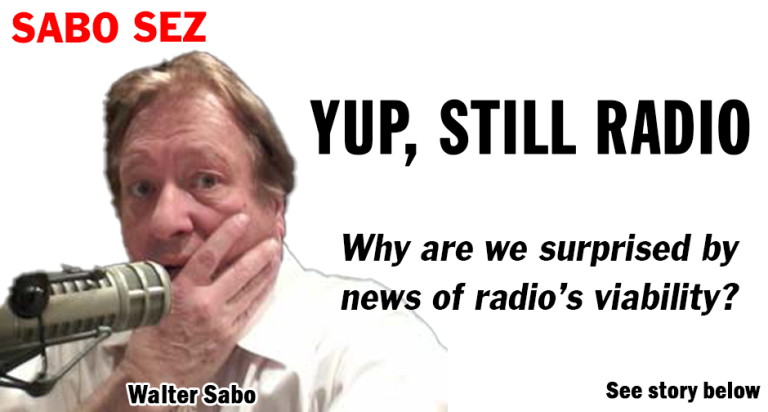By Walter Sabo
A.K.A. Walter Sterling
Radio Host
An article in the Los Angeles Times shows a picture of a radio DJ next to a control board boasting the headline, THE RESURGENCE OF RADIO. Dateline: 1982. This headline appears in various forms every few months in articles and blogs throughout the country. Writers discover radio! The power of radio! The popularity of radio! Why is radio either dying or being rediscovered when neither is true?
Recent artifacts: Every single press release from Nielsen reveals that radio is doing fine thank you. After decades of promoting its television clients and bashing radio, now that Nielsen measures radio – son of a gun – radio is thriving, it’s alive, it’s growing, it’s a success. Nielsen’s tone is one of surprise that radio attracts large, loyal audiences.
Why is radio’s 100 years of success a revelation rather an assumption? First it is because radio is ubiquitous. Walk into a store, radio. Turn on the car, radio. Wake up, radio. The sound of radio has always been everywhere and continues to be everywhere. Maybe once a year I go to a gym and hear Spotify, but I have to ask an employee where that music is coming from and they are never sure! Television is not everywhere; it has to be turned on. Magazines, websites, books, direct mail have to be considered and then opened. Not ubiquitous. Radio’s ubiquity renders it invisible on the media landscape. Radio wins by losing.
Radio salespeople sell radio to negotiators, time buyers. The job of a negotiator is to criticize and devalue the product being pitched. That’s their job. A salesperson spends nine hours a day with negotiators telling them that their product is at death’s door. To a radio salesperson, every day is a bad day. They become immersed in the pessimism of radio’s future.
“Do you realize that most 19-year-olds discover new music from the Internet?” declares a time buyer to a radio salesperson. Oddly, the fact that 19-year-olds occasionally find new music on other audio media is a dark mark against proven radio. Until this moment, the location of new music discovery had never been a deal point for the Honda dealer time buyer. But, boy this “discovery” business is charts-and-graphs serious!
To perform as a programmer or talent in radio one must be an optimist about its future. A programmer or host is intimate with listener response to their work. Radio stars see the millions and millions, and millions of dollars raised for quality charities every single year by their words, their appeal — their credibility. TV stations and newspapers rarely conduct fund drives. Have you ever heard a local TV anchor ask for donations for – anything? No, probably because it wouldn’t work as well as a pitch from the morning host on your station. A powerful, yet unseen, spokesperson can be quite persuasive to a listener to donate their money to a charity.
SiriusXM satellite radio’s lead investors, Apollo and Blackstone jointly engaged me to consult the company on site for many years. During that time, I became well-acquainted with the initiatives of all-digital audio platforms: Audible, Amazon, Pandora, Spotify, Google and many others.
At digital media conferences spokespeople for those companies would sit on panels and bash the dinosaurs called AM and FM. However, those same companies insisted on branding themselves as… radio! Spotify RADIO. Pandora RADIO!
Walter Sabo is a long-time radio industry consultant and thought leader. He hosts and produces a network radio show titled “Sterling on Sunday” 10:00 pm-1:00 am ET. www.waltersterlingshow.com. walter@sabomedia.com



